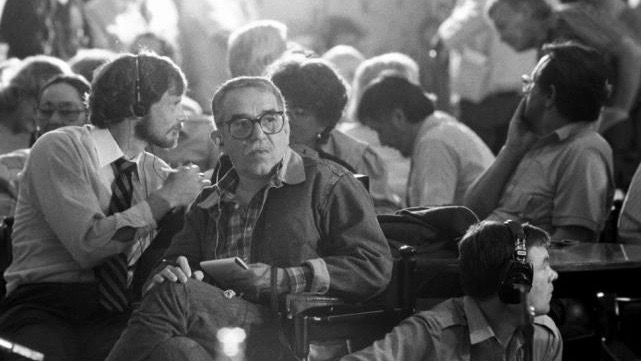by LAURA CAPOTE

“I feel Latin American in every country, but without ever resigning myself to illusions of my land, Aracataca, to which I returned to one day and discovered, that between the reality and the nostalgia, was the raw material of my work”
– Gabriel García Márquez, The Fragrance of Guava, 1982
While García Márquez is internationally recognized for his literary work, little attention is paid to his lifelong dedication to revolutionary internationalism. Laura Capote explores this rich history and his career as a militant journalist
Sometimes what is obvious hides what is important. Gabriel García Márquez is best known as the craftsman par excellence of the genre ‘magical realism’, rather than his profound passion for the profession of journalism that led him to traverse—with the eagerness of a chronicler and a vallenato rhythm in his step—countless cafes, newsrooms, and continents.
Gabo, or Gabito, as he was known to his friends in Aracataca, a town camouflaged among the banana plantations of Colombia’s Caribbean coast, produced a journalism that few recognize, journalism militantly committed to a national and global context. International affairs, and in particular the people that rose up against US imperialism, were the ink for his pen. Instead of hiding behind the sudden fame produced by the publication of ‘One Hundred Years of Solitude’ in 1967, over the years he became radicalized and refined his writing with an acidic humor indebted to those brought up in that “village of twenty houses of mud and reed built on the shore of a river of diaphanous waters that rushed down a bed of polished stones, as enormous and white as prehistoric eggs.”
Crossing a huge diversity of literary and journalistic genres, García Márquez managed to hybridize both professions by deepening his political thought and extending his journalistic interventions to a range of spheres, stretching from reflections within a national and regional context, to international relations and the reality of other continents. The development of Gabo’s personal and professional life went hand in hand with the development of the twentieth century, meaning that many of the major, transcendental social and historical events in mankind’s history in turn became the fundamental building blocks of his own being: the fall of Nazism and fascism in Europe; the Bogotazo and the war between the liberals and conservatives in Colombia; the deployment of Colombian troops in the Korean War; the consolidation of the Soviet Union and the socioeconomic model of Eastern Europe; the triumph of the Cuban revolution; the dictatorship of Rojas Pinilla and Operation Condor in Latin America and the Caribbean; the development of what’s called the Cold War; the hegemonic anticommunist discourse; and the battles for national liberation on the African and Asian continents. All of this, amongst many other events, were key elements in the publications of the writer from Aracataca.
Born and raised in a humble family on the fringes of the Caribbean—with all that this implies including his revolutionary identification with that famous socialist island—García Márquez was, however, a pilgrim of the world. His passion to know the truth, that age-old fetish of journalists, led him to travel and engage with the reality of the different people that he met, and with that he constructed a committed, situated, and militant journalism, that until his last days, sought to create scenarios and platforms which many, many journalists from the continent could publish from without fear of censorship.
People’s Dispatch for more
